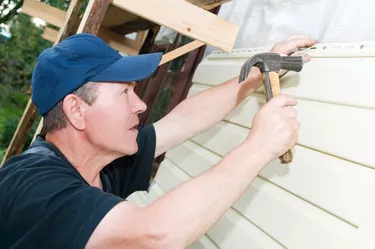
The cost of replacing the siding on a house is potentially deductible, depending on whether you use the house as a personal residence, as a rental property or are in the aluminum siding business. In the event you are unable to claim a deduction for the cost of the siding, you can always increase your tax basis in the home to reduce your capital gains tax when you sell it.
Personal Residence
Video of the Day
Whenever you make improvements to a house you use as a personal residence, the capital asset rules require that you capitalize the cost instead of claiming a deduction. Since the installation of new siding on the exterior of your home has a useful life of more than one year and increases the home's value, you must increase your tax basis in the house by the total cost of the project. Costs you can increase your basis for include the expense of purchasing materials and supplies as well as the cost of hiring a contractor to install the siding.
Video of the Day
It is always important to distinguish between a permanent home improvement that increases your tax basis and a repair.
Rental Properties
The houses you own for purposes of generating rental income aren't capital assets, but the IRS still requires you to increase your tax basis in the house for the costs of installing siding on the home. However, unlike your personal residences, the IRS allows you to claim annual depreciation deductions on the rental home. Depreciation allows you to deduct the entire tax basis of your rental home over a 27.5 or 40-year period in equal amounts. When you increase your tax basis for the cost of the siding project, it will also increase the annual depreciation deduction you are eligible to claim against your taxable rental income.
Siding Repairs
It is always important to distinguish between a permanent home improvement that increases your tax basis and a repair. If you only replace portions of the existing siding on your house because of damage to particular sections, the installation of new siding constitutes a repair, since it only maintains rather than improves the condition of the house. As a result, you don't increase your tax basis in the house for the cost of the siding, nor can you claim a deduction if it's your personal residence. However, if you repair the siding for a rental property, the IRS allows you to claim a deduction from your rental income for the entire cost.
Home Improvement Business
If you operate a home improvement business and accept a job to replace the siding on a customer's home, you can claim a deduction for all costs that are necessary to complete the job on your business tax return. Your deduction includes the cost of purchasing the siding material, supplies and the salaries you pay employees who assist with the siding installation. Moreover, the tax implications to the homeowner have no impact on your ability to claim these business expenses on your return.